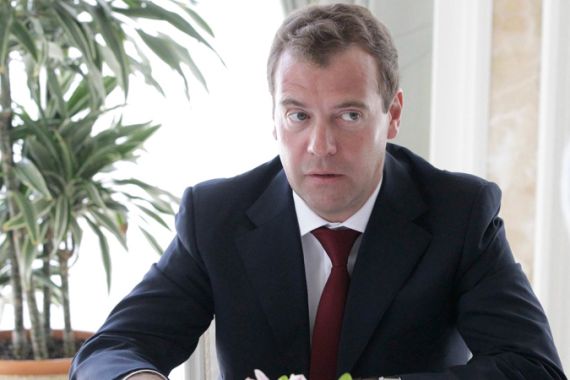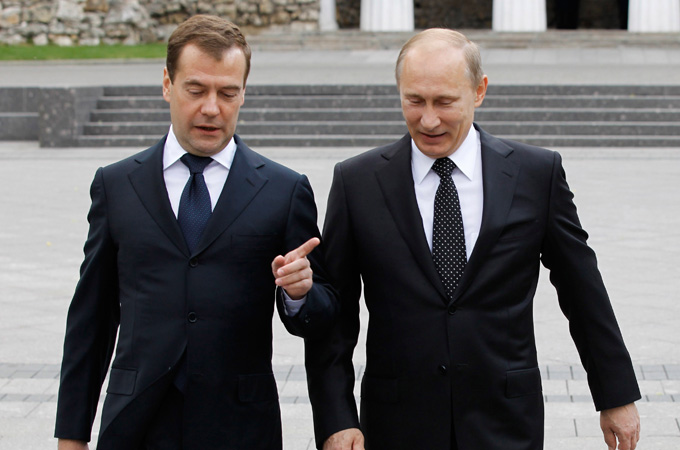Medvedev sets date for Russian vote
Russians to elect new Duma chamber on December 4, but opposition parties have concerns over whether vote will be fair.

 |
| President Dmitry Medvedev (L) and Vladimir Putin haven’t decided yet who will run for president in March 2012 [EPA] |
Russian President Dmitry Medvedev has announced December 4 as the date for parliamentary elections to the State Duma.
The only chamber of the national legislature that is directly elected, the Duma is currently dominated by the United Russia party of Vladimir Putin, the Russian prime minister, which holds 315 out of 450 seats.
The Communists, the nationalist Liberal Democratic Party and the populist Just Russia make up the rest of the Duma, but offer little opposition and influence over policies directed by the Kremlin.
Another group expected to take part in the December vote is Right Cause, a Kremlin-friendly party headed by Mikhail Prokhorov, a Russian tycoon who also owns the New Jersey Nets basketball team.
Right Cause is widely seen as a Kremlin creation designed to lure opposition-minded, pro-business voters, while building an illusion of competition with Putin’s United Russia.
Medvedev made the announcement during a meeting with leaders of political parties with a presence in the Duma at his summer residence in Sochi.
“I would very much want the makeup of our future Duma to maximally reflect the political preferences of the widest range of our citizens,” Medvedev said in a televised remarks.
Steered into the presidency in 2008 by Putin, his predecessor, who faced a constitutional bar on a third straight term, Medvedev has loosened electoral laws, making it slightly easier for other parties to field candidates and win seats.
Both Putin and Medvedev have said they will decide together who will run for president in a March 2012 vote.
Election process
All seats in the Duma are chosen by proportional representation, and a party must get at least seven per cent of the national vote to qualify for seats.
During the 2007 vote, opposition, human rights and vote monitoring groups claimed the Kremlin orchestrated attempts to create a high turnout and a big United Russia win.
Medvedev acknowledged the claims in his address saying “two things are equally unacceptable to us, the administrative lawlessness of officials who are trying to manipulate the elections … and ungrounded claims of falsifications that we often hear from those who lost”.
The vote takes place by party lists with no races between individual candidates. The parties are now expected to compile the lists and those parties not represented in the Duma will also have to collect 150,000 signatures.
One of them was the People’s Freedom Party, known by its Russian acronym as Parnas and founded by three prominent opposition leaders.
In June, the Justice Ministry said the party could not be registered because the ministry had found violations in the required 45,000 signatures the party had submitted with its application.
One of the party’s leaders, Mikhail Kasyanov, a former prime minister, said some people who joined had been summoned by police or security officers who asked why they had joined the opposition party and whether they understood they could lose their jobs, or their children would lose the opportunity to study at university.
Boris Gryzlov, speaker in the Duma and United Russia’s senior official, said in remarks published on Monday that the party’s aim was to preserve its constitutional majority.
With opinion polls and regional elections showing flagging support for the “party of power”, Putin established a broad ‘People’s Front’ earlier this year in a bid to improve its chances in the parliamentary vote.